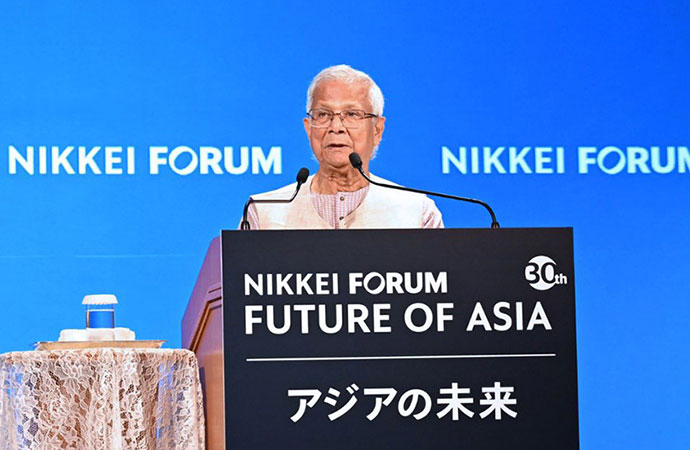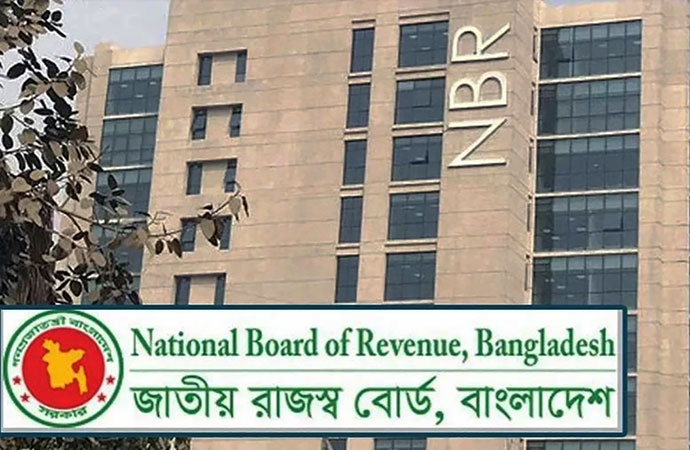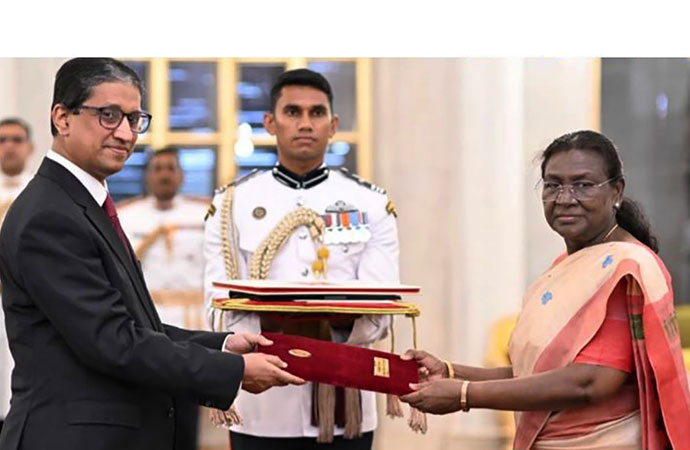Reportage

Chief Adviser Muhammad Yunus. Photo: Chief Adviser GOB
The latent yet growing distrust within the forces that heralded last year's July Uprising, and form the core of support for the interim government, fell out into the open this week, almost causing the collapse of the present administration, and with that what most would consider the entire purpose of that movement.
Following a meeting with Chief Adviser Muhammad Yunus on Thursday, May 22, Nahid Islam - a student leader from the July Uprising against the previous government and now head of the newly formed National Citizen Party (NCP) - told BBC Bangla that Yunus was seriously considering stepping down.
"I cannot work like this if you, all the political parties, cannot reach a common ground," Nahid quoted Yunus as saying. He for his part urged the interim leader to "remain strong", stressing the hopes the public had pinned on Yunus after the July Uprising that ousted the Awami League government.
Following 48 hours of feverish speculation all over the media, of which a big part of course is on social media these days, it was finally settled that Yunus was in fact not leaving, through a meeting of the Advisory Council the following Saturday (May 24).
According to the press briefing following the meeting from the Chief Adviser's Press Wing:
"The Council discussed how unreasonable demands, deliberately provocative and jurisdictionally overreaching statements, and disruptive programmes have been continuously obstructing the normal functioning environment and creating confusion and suspicion among the public.
"The Advisory Council believes that a broader unity is essential to maintain national stability, organise a free and fair elections, justice, and reform, and permanently prevent the return of authoritarianism in the country.
"On this matter, the Interim Government will listen to the views of political parties and clarify its own position.
"Despite all obstacles, the Interim Government continues to fulfil its responsibilities by putting national interests above group interests. However, if-under the instigation of defeated forces or as part of a foreign conspiracy-the performance of these responsibilities becomes impossible, the government will present all reasons to the public and then take the necessary steps with the people."
This was clearly the statement of an embattled administration. The reference to "deliberately provocative and jurisdictionally overreaching statements" was generally viewed as a pointed reference to Army Chief General Waker-uz-Zaman's speech to his fellow officers in the preceding 24 hours, in which he underscored his disagreement with Yunus on key policy issues, including the timing of elections, the proposed humanitarian corridor to Myanmar, and Chattogram Port.
The "disruptive programmes" would have been a reference to the BNP, the monolith in the political arena, and although some would say they constitute the lesser of the interim government's worries, the size of their political constituency - where the IG's is absent or unproven - makes it important to keep them on-side, if the project to get Bangladesh's democracy back on track is to succeed.
Although the part quoted above could have been read as a complete statement, the note from the press wing adds a concluding paragraph that is significant:
"The Interim Government upholds the public expectations of the July Uprising. But if the government's autonomy, reform efforts, justice process, fair election plan, and normal operations are obstructed to the point of making its duties unmanageable, it will, with the people, take the necessary steps."
It may be seen as a reminder to the people of its ultimate debt to the forces that led the July Uprising - i.e. to the students. Yet as if irked at the students swaying into their territory, with the formation of the National Citizen Party, the BNP seems increasingly chastened by the students' presence as their primary competitors in the political arena, now that the Awami League has been seemingly removed from the scene - at least for the moment.
The Army's position
The Army undoubtedly has a stake in the decision over the humanitarian corridor to Myanmar, since humanitarian corridors tend to be essentially military operations. As such, its say would obviously count when it comes to allowing the corridor or otherwise. Sooner or later, they would have to weigh in. The merits of allowing a foreign company, namely DP World of UAE, to operate the New Mooring Terminal at Chattogram Port, can be debated, and they will be between the various stakeholders. Here there is less scope to view whatever has been attributed to the chief as the institutional position of the Army, without some official confirmation.
It is prudent to ask how much we should read into those statements, as there was no official reporting of the army chief's remarks in the press, even though ISPR issued no objection to anything that was reported. Two days after the Advisory Council's meeting, the Army held a very rare press event during which the emphasis was very much on their willingness to cooperate with the IG.
At the press conference held at the Officers' Mess in Dhaka Cantonment, Brig Gen Md Nazim-ud-Daula, director of the Military Operations Directorate (MOD), said, "This is our country. Its welfare and sovereignty are deeply connected to all of us. If we want to keep this country safe, we have to do it ourselves. And if anything goes wrong, we are equally responsible for that too."
Responding to a journalist's question about the "humanitarian corridor", he urged the media not to misrepresent the ongoing discussions regarding the government-military relationship. "I don't believe this issue has reached a point to warrant such criticism or speculation. The government and the Bangladesh Army are working in close coordination and complementing each other. We follow the government's directives. There is no reason to interpret it otherwise," he said.
When his attention was drawn to debates on social media, Nazim said, "Sometimes, even in families, there can be misunderstandings. Similarly, different stakeholders may express varying opinions in the course of running a country. But that does not mean there's division or conflict. Nothing of that sort has happened."
He reiterated that the military has always worked with the government and will continue to do so in future.
"Let us not overcomplicate things. The government and the army are not at odds. We are working together, and I firmly believe we will continue to do so even more effectively in the days ahead."
Addressing the issue of the "humanitarian corridor" raised in some media reports, Nazim clarified, "When I spoke about the Bangladesh-Myanmar border issue and the activities of ARSA, I never used the term 'corridor' ... The movement of armed groups at the border has no connection to any corridor matter."
Col Md Shafiqul Islam, colonel staff of the MOD, echoed the sentiment.
In reply to reporters' query about the army's stance on the corridor, Shafiqul said, "The 'corridor' is a sensitive issue. Let me be clear-Bangladesh Army will never be involved in any action that may compromise national security."
Responding to rumours about the army taking over state power, he said, "There has been no such discussion within the army. We have no intention, no interest, and no information to suggest anything of that sort."
December fever in the BNP
With the BNP however, things seem to be going from bad to worse.
Primarily, the BNP is unhappy with the NCP and its participation in the interim government. The NCP's political rhetoric has often stung the BNP, describing it as part of the old setup with the Awami League. But things seemed to come to a head as the party mounted a week-long street protest alleging that the Yunus government had blocked an Election Commission ruling declaring the BNP's candidate, Ishraque Hossain, as the rightful winner of a disputed 2020 mayoral poll. Specifically, they said Asif Mahmud Shojib Bhuiyan, adviser to the LGRD Ministry in the Yunus administration, prevented Ishraque from taking the oath of office. They demanded his resignation, alongside that of Mahfuj Alam, the other representative of the students in the present government. Although they themselves like to point out that they are not part of the NCP (like Nahid Islam, who left government to take the job as NCP's chief coordinator), this does not hold much water.
The BNP also added a third name, National Security Adviser Khalilur Rahman, to the list of people they wanted gone from the present administration. Crucially, they stuck to their demand ever after meeting Yunus. BNP supporters took great umbrage at Yunus bringing along Asif Mahmud to be a part of that meeting, seeing it as a direct flap on the face of their demand.
On Wednesday (May 28), the party's top leaders said state reforms will be undertaken only after the national election, dismissing any rationale for linking these matters to the electoral process.
"There will be no compromise on elections. No justification exists for delaying the election roadmap in the name of reform or justice. It was BNP, under Begum Khaleda Zia, that first placed reform proposals before the nation," BNP Standing Committee member Amir Khosru Mahmud Chowdhury said while speaking at a youth-focused party rally in Nayapaltan.
Khosru highlighted the party's earlier push for reform, saying, "BNP introduced a 27-point reform agenda two years ago. The people of Bangladesh will decide on reforms-not an 'all-party' commission or any externally imposed structure."
About the calls for accountability for the Awami League, Khasru said, "The fall of Sheikh Hasina's government will be largely credited to the uncompromising struggle of Begum Khaleda Zia, who risked her life, and the relentless efforts of Tarique Rahman. No party has endured or suffered as much as BNP. If justice is to be served, BNP will deliver it."
Another senior BNP leader, Abdul Moyeen Khan, emphasised the pivotal role of students and youth in resisting autocracy and reviving democracy. "Let's not forget, the July-August victories were only the first phase. The current phase of our movement is to ensure fair elections. We are cooperating with the government and expect it to respond by announcing elections without delay."
He said the youths' aspirations must be respected and BNP's movement would only end when power is transferred to elected representatives through democratic means.
In a scathing critique of the interim government, BNP leader Mirza Abbas said, "This administration, once seen as a government of public trust and expectation, has now become a source of disregard. Over the past nine months, the people have received nothing but neglect. This is a colonial-style regime. Most of its members are not even citizens of this country."
Addressing the same rally virtually, the BNP's acting chairman, Tarique Rahman, called on the people of Bangladesh, including party leaders and activists, to prepare for national parliamentary elections to be held by December.
"We call on the interim government: national elections must be held by this December. Once again, I emphasize, elections must take place within this timeframe. Dear countrymen, begin preparations now to ensure national elections are held by December," Tarique said.
He alleged that certain factions within the government are conspiring to delay the elections, saying: "It appears that efforts to stall the upcoming election have already begun. The future of the election seems entangled in endless debates over so-called minor and major reforms. People are starting to believe that these reform discussions are merely tactics to buy time, and that some within and outside the interim government may have ulterior motives."
Urging the government not to treat political parties as enemies, he added: "Neutrality and credibility are the core strengths of the interim government. Therefore, we urge and advise them to refrain from taking actions that could erode public trust and goodwill."
Additionally, in a much-discussed appearance on Indian channel Aaj Tak Bangla, known for its vehement stance against the post-August 5 changes in Bangladesh, Rumeen Farhana, one of the BNP's most prominent faces, mocked the chief adviser to the interim government, questioned its legitimacy, and repeated many of the criticisms that one has heard before in Awami League circles.
Probably the only BNP leader who refrained from calling for a December election in their statements this week was Chairperson Begum Khaleda Zia. She urged people, including BNP leaders and activists, to come forward with a vow to restore democracy in Bangladesh.
"Very soon, we will see Bangladesh reestablished with democracy. This should be our pledge on the martyrdom anniversary of Shaheed Zia. In this sense, I call upon BNP's all-level leaders and activists as well as the people of the country to move forward in a disciplined manner," she said addressing a discussion in the city through a pre-recorded video message.
BNP arranged the discussion at the Institution of Engineers Bangladesh (IEB) auditorium, marking the 44th martyrdom anniversary of BNP founder and President Ziaur Rahman.
Khaleda Zia said Ziaur Rahman embraced martyrdom in the struggle for the establishment of democracy and protection of national sovereignty. "Even today, the uninterrupted journey of that democracy faces obstacles at every step," she said.
Whether the party takes her message to heart and maintains discipline in the days ahead though, remains to be seen. Whenever the next election may be, they are overwhelming favourites to form the next government. From the position that they are in, losing patience, or brooking no competition of the sort represented by NCP is not a good look for the party, which has also faced numerous allegations of extortion from all over the country since the collapse of the AL government. Withdrawing their support to the interim government at a time like this, over a mere six months, may come back to bite it in the future.

























Leave a Comment
Recent Posts
Auspicious beginnings, but a l ...
The newly elected government of Bangladesh is now in office, and the e ...
Caught between tigers and pira ...
Over 10,000 fishermen in the Sundarbans have suspended their fishing a ...
Historic Chawk Bazar comes alive with iftar items on ..
Shaping Young Conservationists: School Conservation ..
Iran has said it has reached an understanding with t ..
New Finance Minister Amir Khosru Mahmud Chowdhury